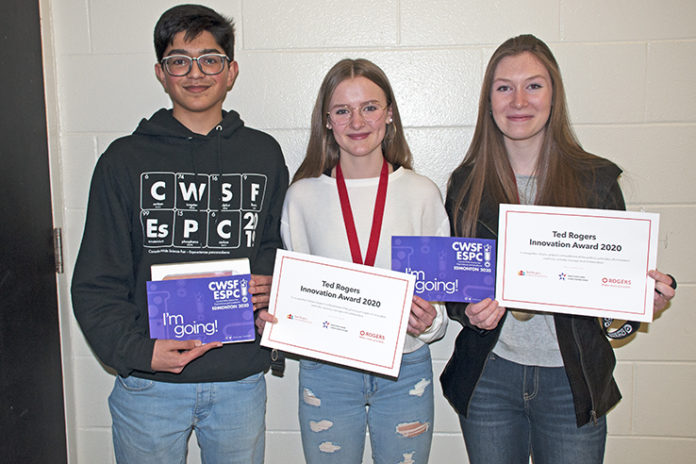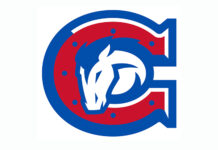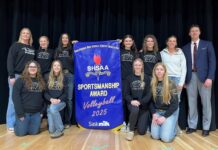
Grade 11 Swift Current Comprehensive High School student Parth Shah had earned the opportunity to advance to his third Canada-Wide Science Fair with an innovative project which utilizes technology in helping detect Arthritis.
Shah topped the 2020 Chinook Regional Science Fair with his project entitled Mind The gAIt: Deciphering Gait Patterns With AI. He designed a cellphone app which uses sensors in the phone and analyses the gait patterns of the users.
The Chinook Regional Science Fair was hosted in March, but days after the event organizers of the 2020 Canada-Wide Science Fair cancelled this year’s edition as a result of preventative measures implemented around the Covid 19- pandemic.
Shah explained that physicians have been utilizing more advanced technologies to assist in their detection and diagnosis of a variety of diseases including arthritis.
“Doctors have been using Artificial Intelligence to guide them along the process of diagnosing breast cancer and brain tumours. At the same time I also saw another research piece that said that gait was linked with arthritis and osteoarthritis within the hips and the knees. So I thought that why not take what doctors are doing right now and apply it to the field of biomechanics and see whether or not I could take advantage of this relationship that has been found, and use Artificial Intelligence to diagnosis arthritis.”
“There’s so much that this project has potential for. Artificial Intelligence can be applied anywhere really. This isn’t something new, I’m just bringing it to a new field.”
He concedes he was not able to get a strong accuracy result for the arthritis diagnosis because of limited data. As Artificial Intelligence is data driven, the more data he would be able to utilize would provide him better the results. And while Shah only had 100 samples from various individuals for his initial study, he is hoping to reach out to the healthcare field to see if he can be exposed to populations of people more prone to arthritis.
From the data he did collect from people with different gaits he was able to determine with accuracy some unexpected information.
“What I was able to do was, actually really astonishingly, I was able to have a 95 and above per cent accuracy rate in predicting height, weight and age all by using gait.”
Shah, who is interested in pursuing a medical career, said his research has also been inspired by previous trips to the national science fair as both a Grade 8 student in 2017 and last year as a Grade 10 student.
“Ever since I went in Grade 8, I was astonished by the experience I had. It was life changing really. So every year I work pretty much the whole year to get back there again.
The Hazlet School duo of Andra Todd and Cadence Anderson earned the opportunity to attend their first Canada-Wide Science Fair with their project entitled Good Vibrations.
“Basically we created a sensor so that blind people do not have to use a white cane or a service dog,” Anderson explained.
“We came up with the idea, we knew we wanted to help people but we also knew that we wanted to do something with technology. So we actually had the idea of a car sensor and then put it on a person. When we first created it we didn’t quite know how we were going to do it,” Todd added.
The Grade 9 duo utilized an Arduino program in their project, so they learned about and programmed a sensor to set off a motor which vibrates when you get close to an obstacle.
To test out their project they set up obstacle courses and tested it out on their friends and classmates.
“We had them blindfolded and we set up mats to make an obstacle course and they had to walk through it,” Anderson noted.
A full list of winners from the Chinook Regional Science Fair are as follows:
Best in Fair
Parth Shah, SCCHS – Mind The gAIt: Deciphering Gait Patterns with AI Powered Machine Learning.
Second Place
Andra Todd and Cadence Anderson, Hazlet School – Good Vibrations.
Ted Rogers Innovation Award
Andra Todd and Cadence Anderson, Hazlet School – Good Vibrations.
Third Place
Vaishu Venkata, All Saints School – Removing Oil From Water.
Fourth Place
Dylan Hogg and Levin Wiebe, Stewart Valley School – Floating Future.
MEDAL WINNERS
SENIOR
GOLD – Parth Shah, SCCHS – Mind The gAIt: Deciphering Gait Patterns With AI Powered Machine Learning.
SILVER – Cole Sletten and Davin Garvin, Hazlet School – Refaced Waste.
BRONZE – Jordan Anderson and Jaden Todd, Hazlet School – Muscles.
INTERMEDIATE
GOLD
Andra Todd and Cadence Anderson, Hazlet School – Good Vibrations.
SILVER
Hollyn Rempel (Success School) – Squeaky Clean.
JUNIOR
GOLD
Vaishu Venkata, All Saints School – Removing Oil From Water.
Mya Leibel and Brooklyn Siemens, All Saints School – Magic Sand.
Braden Baumann, Hazlet School – Does Temperature Affect Sleep?
SILVER
Levin Wiebe and Dylan Hogg, Stewart Valley School – Floating Future.
Hunter Stock and Nathan Wiseman, Hazlet School – Antler Trap.
BRONZE
Elyza Gonzales, All Saints School – Splitting Water Into Hydrogen and Oxygen.
Dani Meyer and Rachel Noble, Fairview School – Water You Doing?
Nafy Eticha, All Saints School – Distillation and Filtration.
Sophie Carlson and Olami Akinfiresoye, All Saints School – Coke and Chlorine.
Brenna Silzer and Shaelyn Feicht, Fairview School – Warming Ice Breaking News.
Science Puzzle Winners
Levin Wiebe (Stewart Valley); Emelia Lilja (Fairview); Krysten Gardner (All Saints); Kaleb McBurney (All Saints); Nalani Chan (All Saints); MacKenna Nerada (Success); Erika Olson (Stewart Valley); Maddex Gording Duvall (All Saints).
Science Olympics – Spaghetti/Newspaper Bridge Structure: 1. Riley Starkey,Sean Friesen, Keira Walters (Fairview School and Ponteix School); 2. Gabby Raynard, Elaina Sauder, Samara Moffitt, Cydny Price (Fairview School); 3. Tia Noble, Reziel Egoc, Sharmaine Palaganas, Karlee Keith (Ponteix School).





